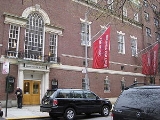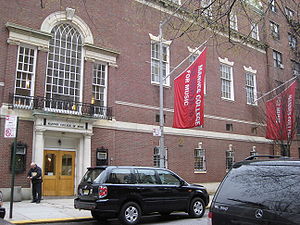
Mannes College of Music
Encyclopedia
Mannes College The New School for Music (icon) is The New School
university's music conservatory. While the university's main campus is located in Greenwich Village
, New York City
, Mannes maintains its main academic building on the Upper West Side
of Manhattan
.
 Originally called The David Mannes Music School, it was founded in 1916 by David Mannes
Originally called The David Mannes Music School, it was founded in 1916 by David Mannes
, concertmaster of the New York Symphony Orchestra
and Clara Damrosch, sister of Walter Damrosch, then conductor of that orchestra. Originally housed on East 70th Street (later occupied by the Dalcroze School), the campus was created out of three brownstones on East 74th St, in Manhattan
's Upper East Side
. After 1938, the school was known as the Mannes Music School (possibly in conjunction with the retirement of David and Clara Mannes from active teaching). In 1953 Mannes began offering degrees and changed its name to the Mannes College of Music. It later merged with the Chatham Square Music School. In 1984 the school moved to its current home on West 85th Street. In 1989 Mannes joined The New School
, comprising eight schools (including Parsons School of Design, Eugene Lang College, and the New School for Drama). In 2005 Mannes changed its name to Mannes College the New School for Music.
and aural skills
classes.
Though music theory was taught at Mannes from its inception, a major turning point occurred in 1931 with the hiring of Hans Weisse, one of the leading students of Heinrich Schenker
. Over the following nine years, Weisse promoted not just the study of Schenkerian Analysis
but began to incorporate it into the musical life of the school, including performance and composition. Because of his association with the school, Schenker's publication Five Graphic Music Analyses (Fünf Urlinie-Tafeln) was published jointly by his regular publisher, Universal-Edition and the David Mannes School in 1932.
In 1940, Weisse died unexpectedly and was replaced by Felix Salzer
. Salzer, also a student of Schenker, built upon Weisse's foundation by reorganizing the theory program into the Techniques of Music department. The philosophy behind this move was and is to integrate musicianship, theory, and performance - which was based on Schenker's concept of the role of theory in music. Salzer's leading student, Carl Schachter
, as well as his students, continued and strengthened the department.
The New School
The New School is a university in New York City, located mostly in Greenwich Village. From its founding in 1919 by progressive New York academics, and for most of its history, the university was known as the New School for Social Research. Between 1997 and 2005 it was known as New School University...
university's music conservatory. While the university's main campus is located in Greenwich Village
Greenwich Village
Greenwich Village, , , , .in New York often simply called "the Village", is a largely residential neighborhood on the west side of Lower Manhattan in New York City. A large majority of the district is home to upper middle class families...
, New York City
New York City
New York is the most populous city in the United States and the center of the New York Metropolitan Area, one of the most populous metropolitan areas in the world. New York exerts a significant impact upon global commerce, finance, media, art, fashion, research, technology, education, and...
, Mannes maintains its main academic building on the Upper West Side
Upper West Side
The Upper West Side is a neighborhood in the borough of Manhattan, New York City, that lies between Central Park and the Hudson River and between West 59th Street and West 125th Street...
of Manhattan
Manhattan
Manhattan is the oldest and the most densely populated of the five boroughs of New York City. Located primarily on the island of Manhattan at the mouth of the Hudson River, the boundaries of the borough are identical to those of New York County, an original county of the state of New York...
.
History

David Mannes
David Mannes was an American violinist, conductor, and educator.Mannes studied in Berlin with Karol Haliř and was a violinist in the New York Symphony Orchestra from 1891 and its concertmaster from 1898 to 1912. In 1912 he helped found the Colored Music Settlement School and in 1916, with his...
, concertmaster of the New York Symphony Orchestra
New York Philharmonic
The New York Philharmonic is a symphony orchestra based in New York City in the United States. It is one of the American orchestras commonly referred to as the "Big Five"...
and Clara Damrosch, sister of Walter Damrosch, then conductor of that orchestra. Originally housed on East 70th Street (later occupied by the Dalcroze School), the campus was created out of three brownstones on East 74th St, in Manhattan
Manhattan
Manhattan is the oldest and the most densely populated of the five boroughs of New York City. Located primarily on the island of Manhattan at the mouth of the Hudson River, the boundaries of the borough are identical to those of New York County, an original county of the state of New York...
's Upper East Side
Upper East Side
The Upper East Side is a neighborhood in the borough of Manhattan in New York City, between Central Park and the East River. The Upper East Side lies within an area bounded by 59th Street to 96th Street, and the East River to Fifth Avenue-Central Park...
. After 1938, the school was known as the Mannes Music School (possibly in conjunction with the retirement of David and Clara Mannes from active teaching). In 1953 Mannes began offering degrees and changed its name to the Mannes College of Music. It later merged with the Chatham Square Music School. In 1984 the school moved to its current home on West 85th Street. In 1989 Mannes joined The New School
The New School
The New School is a university in New York City, located mostly in Greenwich Village. From its founding in 1919 by progressive New York academics, and for most of its history, the university was known as the New School for Social Research. Between 1997 and 2005 it was known as New School University...
, comprising eight schools (including Parsons School of Design, Eugene Lang College, and the New School for Drama). In 2005 Mannes changed its name to Mannes College the New School for Music.
Techniques of Music
The Techniques of Music program is the foundation for academic musical study at Mannes, encompassing the range of elementary to advanced music theoryMusic theory
Music theory is the study of how music works. It examines the language and notation of music. It seeks to identify patterns and structures in composers' techniques across or within genres, styles, or historical periods...
and aural skills
Ear training
Ear training or aural skills is a skill by which musicians learn to identify, solely by hearing, pitches, intervals, melody, chords, rhythms, and other basic elements of music. The application of this skill is analogous to taking dictation in written/spoken language. Ear training may be...
classes.
Though music theory was taught at Mannes from its inception, a major turning point occurred in 1931 with the hiring of Hans Weisse, one of the leading students of Heinrich Schenker
Heinrich Schenker
Heinrich Schenker was a music theorist, best known for his approach to musical analysis, now usually called Schenkerian analysis....
. Over the following nine years, Weisse promoted not just the study of Schenkerian Analysis
Schenkerian analysis
Schenkerian analysis is a method of musical analysis of tonal music based on the theories of Heinrich Schenker. The goal of a Schenkerian analysis is to interpret the underlying structure of a tonal work. The theory's basic tenets can be viewed as a way of defining tonality in music...
but began to incorporate it into the musical life of the school, including performance and composition. Because of his association with the school, Schenker's publication Five Graphic Music Analyses (Fünf Urlinie-Tafeln) was published jointly by his regular publisher, Universal-Edition and the David Mannes School in 1932.
In 1940, Weisse died unexpectedly and was replaced by Felix Salzer
Felix Salzer
Felix Salzer was an Austrian-American music theorist, musicologist and pedagogue. He was one of the principal followers of Heinrich Schenker, and did much to refine and explain Schenkerian analysis after Schenker's death....
. Salzer, also a student of Schenker, built upon Weisse's foundation by reorganizing the theory program into the Techniques of Music department. The philosophy behind this move was and is to integrate musicianship, theory, and performance - which was based on Schenker's concept of the role of theory in music. Salzer's leading student, Carl Schachter
Carl Schachter
Carl Schachter is an American music theorist, renowned as arguably the most influential Schenkerian analyst since Schenker himself. He studied with Felix Salzer, who was later co-author with Schachter of the influential text, Counterpoint in Composition. He received the B.S., from the Mannes...
, as well as his students, continued and strengthened the department.
Notable faculty
For a complete list of notable New School faculty, see List of The New School people.Notable alumni
For a complete list of notable New School alumni, see List of The New School people.See also
Related Topics- Education in New York CityEducation in New York CityEducation in New York City is provided by a vast number of public and private institutions. The city's public school system, the New York City Department of Education, is the largest in the world, and New York is home to some of the most important libraries, universities, and research centers in...
- The New York IntellectualsThe New York IntellectualsThe New York Intellectuals were a group of Jewish American writers and literary critics based in New York City in the mid-20th century. They advocated left-wing politics but were also firmly anti-Stalinist...
- Education in New York CityEducation in New York CityEducation in New York City is provided by a vast number of public and private institutions. The city's public school system, the New York City Department of Education, is the largest in the world, and New York is home to some of the most important libraries, universities, and research centers in...
- The New York Foundation
- Project Pericles
- National Book AwardNational Book AwardThe National Book Awards are a set of American literary awards. Started in 1950, the Awards are presented annually to American authors for literature published in the current year. In 1989 the National Book Foundation, a nonprofit organization which now oversees and manages the National Book...

